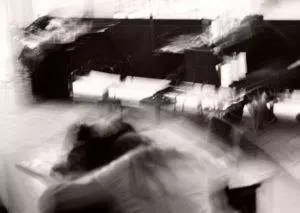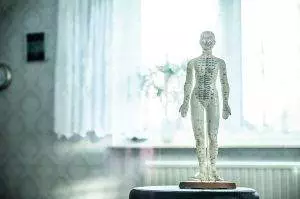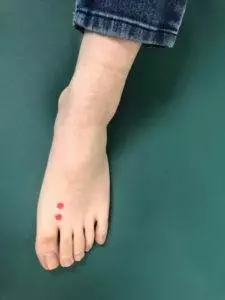By Qineng Tan, L.Ac., Ph.D. & Xiaomei Cai, L.Ac., Ph.D.

Feeling light-headed and dizzy? Maybe you feel like your head is spinning, or that the world is spinning around you? Headache, nausea, dizziness, and vertigo are symptoms that can be caused by a variety of health problems. Acupuncture and TCM offer vertigo treatment that can help relieve that sense of dizziness and nausea, or feeling light-headed and tired all the time.
Feeling dizzy is one the most common reasons that people go in for a doctor’s visit, or even visit the emergency room. Dizziness is a fairly general term that can mean anything from feeling light-headed, woozy, faint, off-balance, or unsteady to feeling nauseated or like you’re about to pass out.
Vertigo is a specific type of dizziness that refers to a sensation of spinning, as if the room around you is moving. You might feel like you’re leaning to one side, or about to fall over. It can make you feel sick to your stomach, similar to motion sickness. In popular culture, the word “vertigo” is sometimes used to mean a “fear of heights,” but that is actually called “acrophobia.” The sensation of vertigo can be triggered by looking down from above, or looking up at something very tall, but this is not the cause of most episodes of vertigo.

Vertigo causes include migraines and problems with the inner ear. The inner ear and eyes both relay information to the brain about a person’s spatial relation to the environment, so when the functioning of the eyes or ears is disrupted, it can cause a sense of imbalance, and even nausea. Migraine headaches, particularly a specific type called a vestibular migraine, can cause pressure in the head and dizziness and nausea.
Benign paroxysmal positional vertigo (BPPV) is one type of vertigo that causes short-term bouts of sudden dizziness. Benign positional vertigo is caused by the shifting of calcium crystals (canaliths) in the inner ear. This can happen due to a head injury or simply aging.
Other inner ear problems that can cause signs of vertigo include Meniere’s disease and Labyrinthitis. Meniere’s disease is a chronic disorder related to abnormal amounts of fluid (endolymph) collecting in the inner ear. The exact cause of Meniere’s is unknown, but it develops more frequently later in life. Meniere’s disease causes attacks of vertigo that can last from a few hours up to 24 hours. Like migraines with an aura, there is often a period of time during which a set of “warning symptoms” begin to occur, such as: a feeling of uneasiness, being off-balance, headache and dizziness, queasiness, hearing loss or ringing in the ears, or extra sensitivity to sound. Once an attack of vertigo hits, it can be quite severe, causing intense pressure in the ear, blurred vision, vomiting or diarrhea, cold sweats, rapid heart rate, and feelings of fear and panic. There is currently no cure for Meniere’s.
Labyrinthitis refers to inflammation of the small parts of the inner ear, or around the nerves of the inner ear that can be caused by viral or bacterial infections, such as: a flu, measles, herpes, hepatitis, Epstein-Barr, chicken pox, or childhood ear infections. Symptoms of labyrinthitis can include: dizziness, nausea, tinnitus (ringing in the ears), and difficulty concentrating.
Lightheadedness is a similar sensation to dizziness in some ways, but is usually caused by a sudden change in blood pressure or the flow of blood to the head. You have probably experienced feeling light headed and dizzy when you get up too fast from sitting or lying down. Other causes of lightheadedness include: allergies, anxiety, anemia, hyperventilating, arrhythmia, or heavy bleeding (as during menstruation).
Dizzy spells happen to everyone once in a while. But recurrent headache and dizziness should be addressed. Acupuncture and TCM have been used to help dizziness for thousands of years and offer natural solutions to the underlying causes of vertigo.
Top 10 Causes of Dizziness

Feeling light headed and dizzy, or having headache, nausea, dizziness, can occur as symptoms of a variety of imbalances. Reasons for dizziness may include:
- Inner ear imbalance, or labyrinthitis
- Meniere’s disease
- Sleep apnea, snoring
- Migraine – vestibular migraine
- Dehydration – alcohol, diuretics
- Sinus issues
- Ear infection
- Low Blood Sugar – diabetes, hypoglycemia
- Multiple Sclerosis (MS)
- Prescription Medication side effects
Dizzy spells that occur first thing in the morning are common for some people. This can be simply due to the change in pressure in the ear when you get out of bed. Waking up dizzy due to sleep apnea occurs because this condition obstructs your breathing during the night, and you may have lower oxygen levels when you wake up. Being dehydrated is another common cause of dizziness, which is exacerbated by drinking alcohol before bed. In general, drinking too much caffeine, too much alcohol, and not enough water, or taking diuretics can all lead to dizzy spells. Low blood sugar, whether due to diabetes, or simply not eating regularly enough, can also be a cause of light-headedness. Hepatitis, HBV, or HCV can also cause dizziness.
Postural orthostatic tachycardia syndrome (POTS) causes dizziness when moving from a seated or position or lying down to standing up.
Cervical vertigo, or cervicogenic dizziness, is another type of vertigo caused by the positioning of the neck or cervical spine; in this case, the feelings of imbalance and spinning may be accompanied by neck pain. This type of vertigo may happen, for instance, after a whiplash injury.
Treatment for Vertigo
The medical treatment for dizziness and vertigo depends wholly on the underlying causes for the symptoms. If a bacterial infection in the ear is confirmed, then antibiotics may be used. In cases of BPPV, a canalith repositioning procedure (CRP) is a non-invasive technique that can help the crystals within the inner ear move back into their proper place. Migraine-related vertigo may be treated with the medications typically prescribed for migraines. Anti-nausea drugs like Dramamine may be suggested. Patients suffering from cervical vertigo may be referred to physical therapy to help improve the positioning and strength of their neck/cervical spine.
Can Acupuncture Help Dizziness?

One of the central concepts of TCM is that of the root and the branches. The branches are the visible, outward signs or symptoms of a problem, while the root refers to what is going on deeper in the organ systems of the body. In the cases of dizziness and vertigo, there is deficiency in the root and excess in the branches.
Pathogenic factors involved in dizziness and vertigo are phlegm, wind, fire, and deficient Qi. When there is weakness in organs like the spleen, stomach, kidney, or heart, pathogens like wind, heat, and phlegm can take hold. The San Jiao, also known as the “triple burner,” is another important concept in TCM; one of its primary functions is to control the movements of fluids in the body so that they don’t collect and build up inappropriately. In case of vertigo, phlegm and heat develop to the point of causing stagnation and malfunctioning of the Jiao, pushing phlegm upwards in the body. An acupuncture practitioner will carefully listen and observe to discover which organ systems are out of balance, and work to strengthen those areas. For example, dizziness combined with emotional disturbances like anger and depression is a sign of too much wind or heat in the Liver. Weakness in the heart or spleen may follow a long illness or period of stress and anxiety. Too much phlegm, heat, and dampness in the stomach and spleen can result from an improper diet and too much stress.
Acupuncture and herbs to tonify these organs and clear heat and phlegm will take care of the root of the dizziness. Meanwhile, specific acupuncture points can have an almost immediate effect at relieving immediate discomfort, facilitating a natural vertigo cure.
A study conducted at a hospital in Taiwan used acupuncture to treat patients with dizziness and vertigo. The findings conclusively showed immediate improvement in symptoms.
A study of 60 patients who were admitted to an emergency room suffering from vertigo from a variety of causes, including Meniere’s and BPPV, showed that acupuncture treatment provided immediate relief of symptoms and is therefore a good alternative for dizziness due to various causes.
Top 5 Tips to Get Rid of Dizziness
Depending on the cause of the vertigo, there are different ways to manage with TCM techniques, including vertigo exercises, acupressure for dizziness, moxibustion, and foods to avoid.

Major 4 types of Vertigo/Dizziness presentation:
- Hypertension type – When a person has high blood pressure, too much liver yang, and is overheated, it can cause dizziness. For this, we use acupressure Liver points 2 and 3 on the toes.
- Qi and Blood deficiency – if a person shows signs of anemia, or has heavy periods, hemoglobin is low, or if a person has chronic conditions, or has suffered a major injury, or recently given birth, experienced major blood loss. For this we want to ensure a good diet with plenty of soups and easy to digest foods. Moxa on the back can help to strengthen the body’s Qi and produce enough blood. Qi Gong exercise of squeezing the earlobes and outer ear up and down is helpful.
- Kidney essence deficiency – this could be due to some constitutional weakness, or due to old age, or someone who tends to have chronic illness, diarrhea. The kidney essence can’t support rising essence to the head. For this, acupressure for Kidney 1 – on the bottom of the foot.
- Phlegm stagnation – when the middle jiao is not working due to stagnation of phlegm creating blockage so Qi cannot ascend. This happens when people are overweight, or have poor digestion, diarrhea. Avoid dairy and fried foods, which encourage phlegm. Moxibustion treatment to the back is helpful, and applying pressure to Stomach-36 acupressure point can help the middle jiao open up.
- Neck Pain – if a neck problem is causing a blockage, due to a neck disease or bulging disc, unhealthy cervical disks, compression, tension, and muscle spasms can block upwards energy. Exercises to encourage the health of the neck discs, loosen up the muscles and allow flow of Qi and blood up to the head. Your acupuncture practitioner will recommend neck exercises to help with this.
Acupuncture Near Me for Dizziness
Vertigo and dizziness may not be life-threatening symptoms, but they can have a big impact on your daily life. Frequently being blindsided by unexpected dizziness, spinning sensations, nausea, and headaches is unsettling and debilitating. Medications can be helpful in some cases, but they can also cause unwanted side effects. Getting to the root cause of vertigo with acupuncture and TCM will help get rid of dizzy spells so they don’t keep coming back.
*This article is for education from the perspective of Traditional Chinese Medicine only. The education provided by this article is not approved by FDA to diagnose, prevent, treat and cure human diseases. It should not stop you from consulting with your physician for your medical conditions. Traditional Chinese Medicine is based on Qi, which is an invisible force that usually cannot be observed by modern science. Because science focuses on testing ideas about the natural world with evidence obtained through observation, these aspects of acupuncture can’t be studied by science. Therefore acupuncture and Chinese herbs are often not supported by double-blind, randomized trials, and they are considered alternative medicine therapies in the United States.
